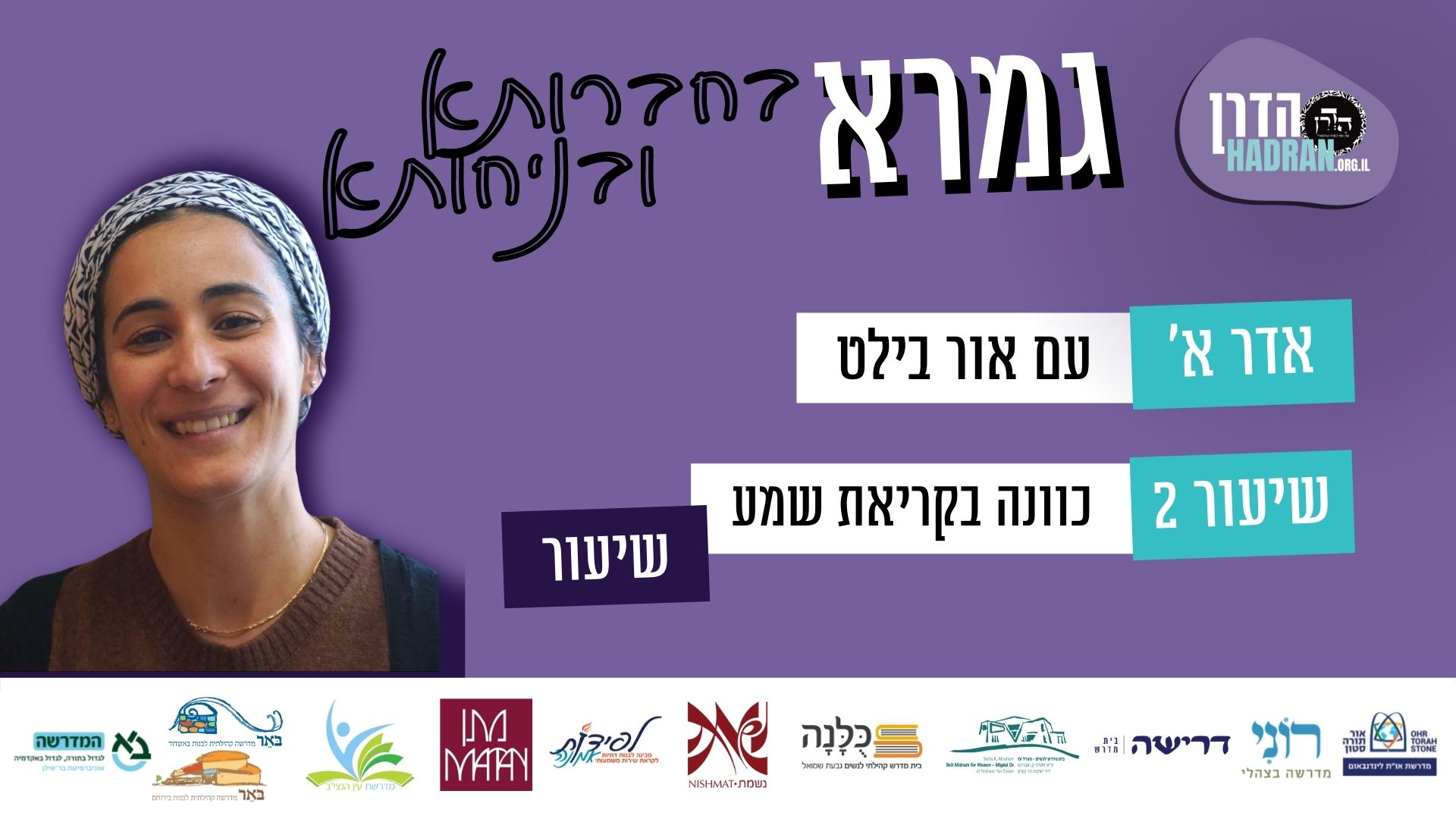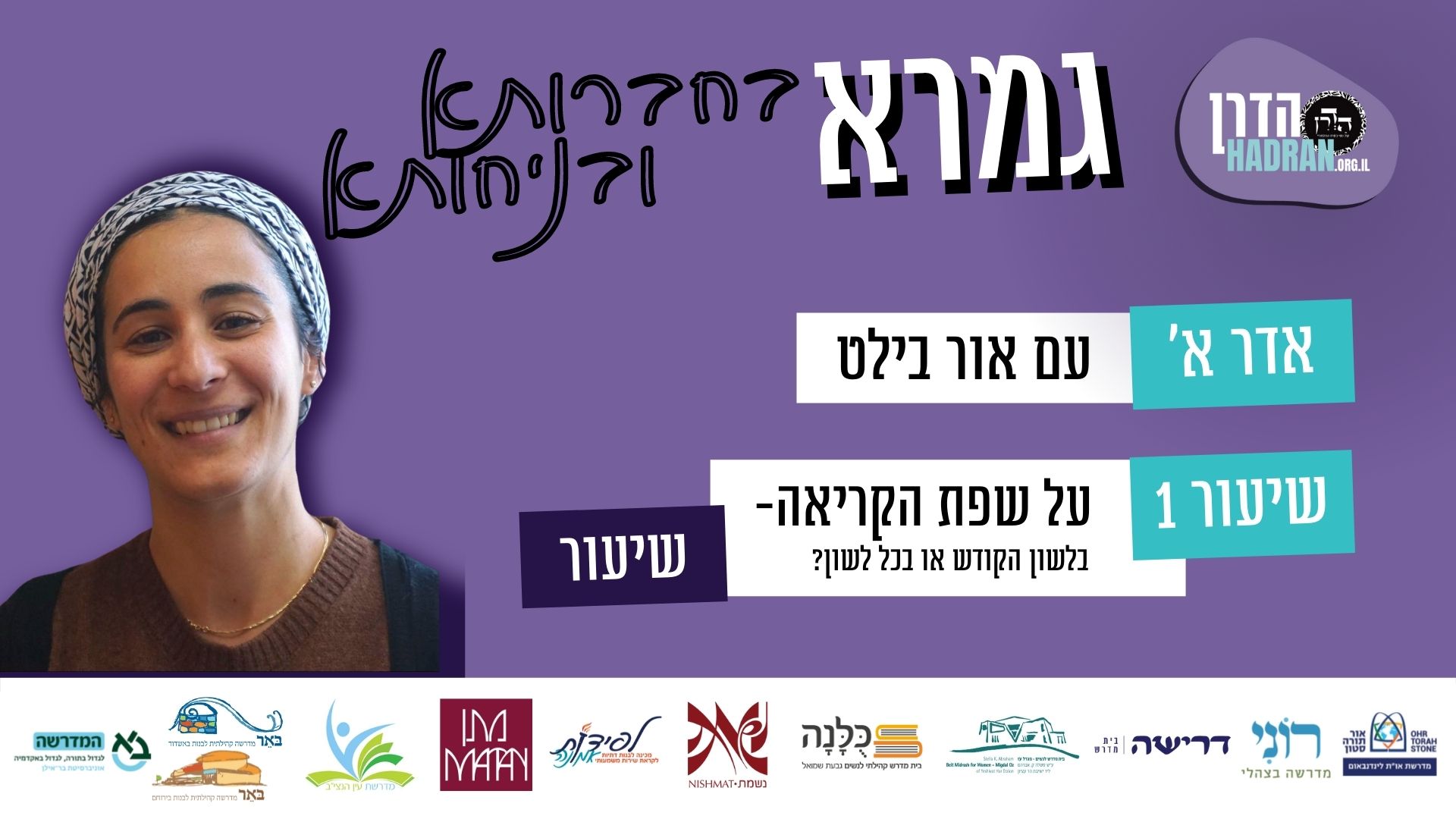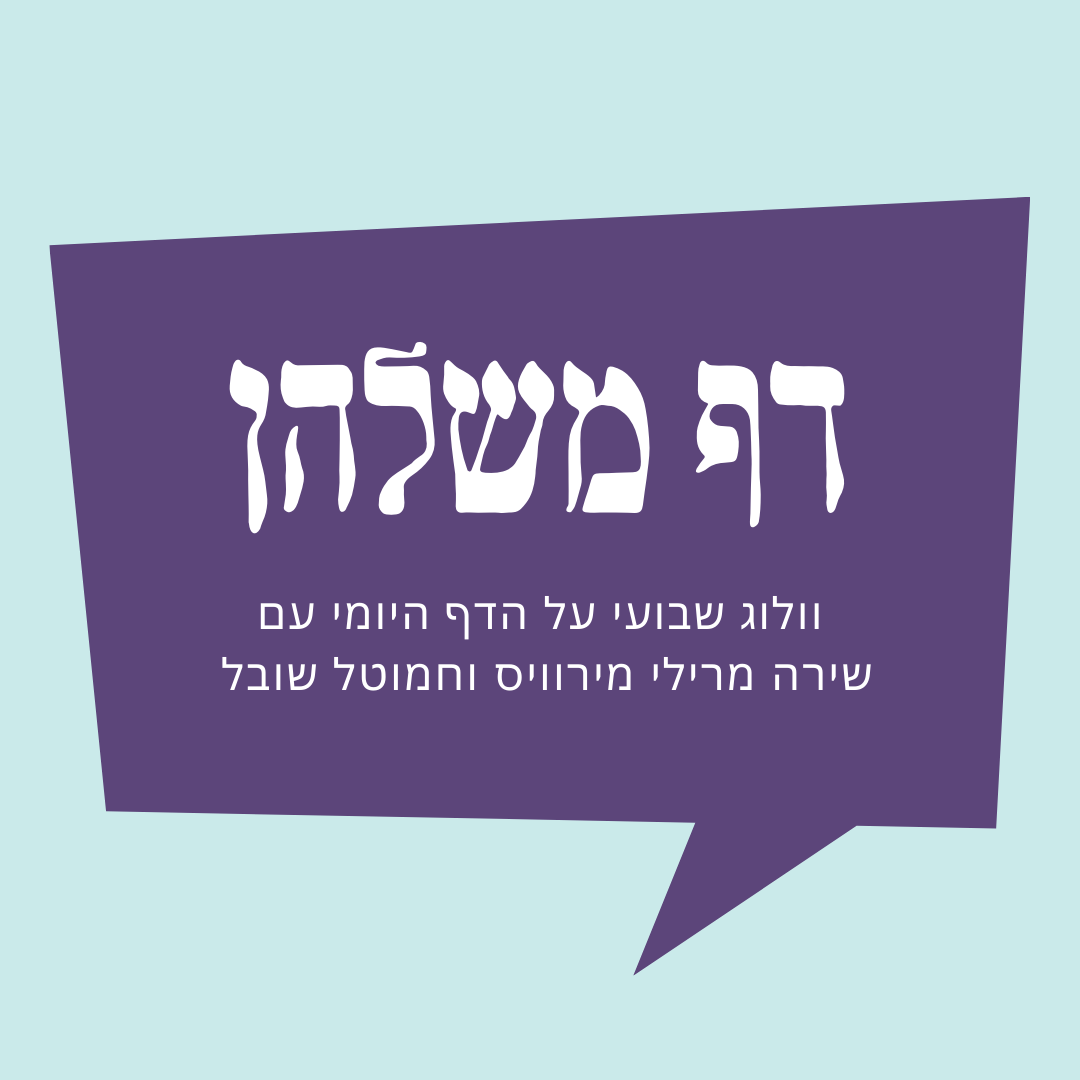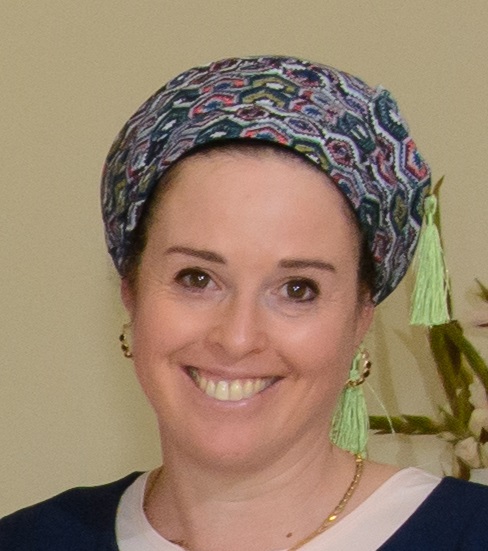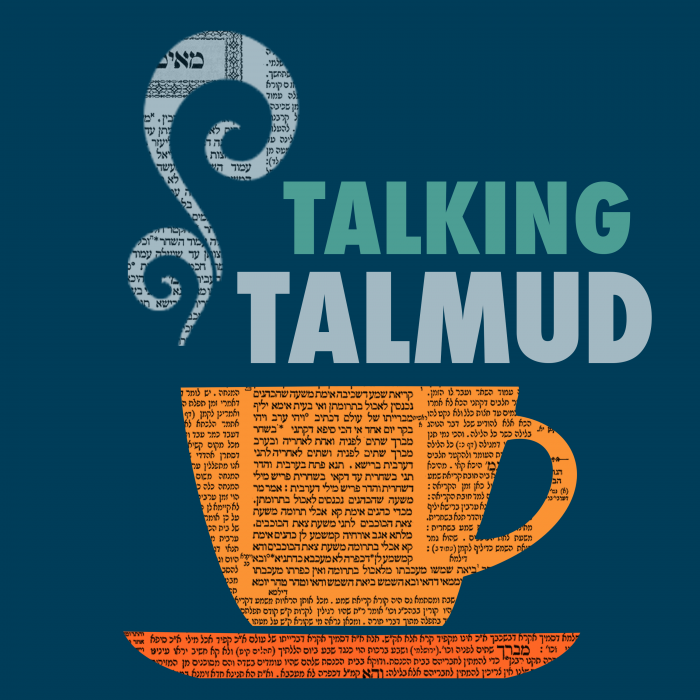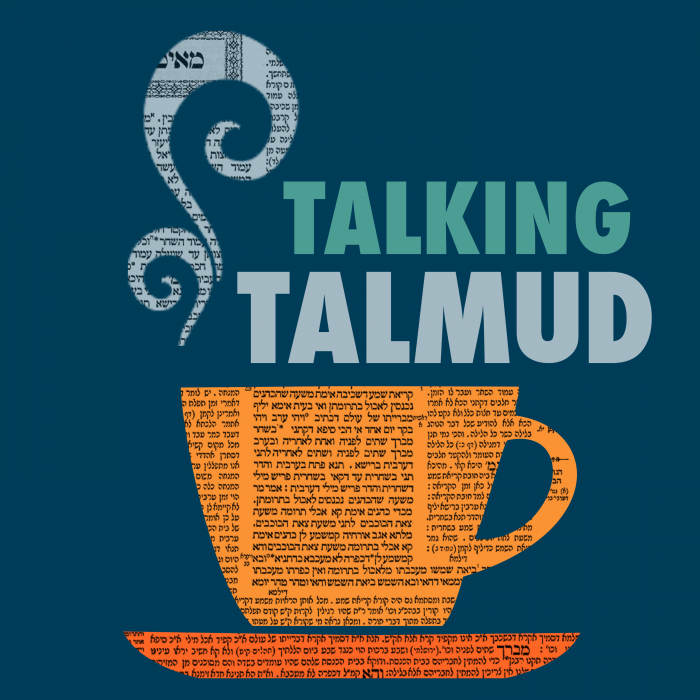איזה דברים חייבים להזכיר בברכת המזון? איך מסתיים ברכת בונה ירושלים? למה המבנה של הברכה הרביעית שונה? למה? אם טעה ולא הזכיר רצה בשבת או הזכרות אחרות בימים מיוחדים? מה השיעור של אוכל שצריך לאכול כדי להתחייב בזימון? יש מחלוקת. האם זה תואם מחלוקת דומה בין אותם שני אנשים לגבי שיעורים או האם זה סותר? איך אפשר לפתור את הסתירה? האם הנוסח של הזימון משתנה לפי מספר האנשים שבזימון?
רוצה להקדיש שיעור?
כלים
העמקה
רוצה להבין מה באמת קורה מתחת לפני השטח של הסוגיה?
שיעורים, פודקאסטים והרחבות של מיטב המורות שלנו יפתחו לך עוד זוויות וכיווני חשיבה.
חדשה בלימוד הגמרא?
זה הדף הראשון שלך? איזו התרגשות עצומה! יש לנו בדיוק את התכנים והכלים שיעזרו לך לעשות את הצעדים הראשונים ללמידה בקצב וברמה שלך, כך תוכלי להרגיש בנוח גם בתוך הסוגיות המורכבות ומאתגרות.
פסיפס הלומדות שלנו
גלי את קהילת הלומדות שלנו, מגוון נשים, רקעים וסיפורים. כולן חלק מתנועה ומסע מרגש ועוצמתי.
ברכות מט
וְזוֹ נִתְּנָה בִּשְׁלֹשׁ עֶשְׂרֵה בְּרִיתוֹת.
and that, the covenant of circumcision, was given with thirteen covenants, as the word brit, covenant, appears thirteen times in the portion dealing with the circumcision of Abraham (Genesis 17:1–14).
רַבִּי אַבָּא אוֹמֵר: צָרִיךְ שֶׁיֹּאמַר בָּהּ הוֹדָאָה תְּחִלָּה וָסוֹף. וְהַפּוֹחֵת לֹא יִפְחוֹת מֵאַחַת. וְכׇל הַפּוֹחֵת מֵאַחַת — הֲרֵי זֶה מְגוּנֶּה.
Rabbi Abba says: One must mention thanks in the blessing of thanksgiving in Grace after Meals at the beginning and the end of the blessing. And one who decreases the number of expressions of thanksgiving may not decrease their number to fewer than one, and if anyone decreases their number to fewer than one, it is reprehensible.
וְכׇל הַחוֹתֵם ״מַנְחִיל אֲרָצוֹת״ בְּבִרְכַּת הָאָרֶץ, וּ״מוֹשִׁיעַ אֶת יִשְׂרָאֵל״ בְּ״בוֹנֵה יְרוּשָׁלָיִם״ — הֲרֵי זֶה בּוּר. וְכׇל שֶׁאֵינוֹ אוֹמֵר בְּרִית וְתוֹרָה בְּבִרְכַּת הָאָרֶץ, וּמַלְכוּת בֵּית דָּוִד בְּ״בוֹנֵה יְרוּשָׁלָיִם״ — לֹא יָצָא יְדֵי חוֹבָתוֹ.
The Gemara added that the conclusions of the blessing of the land and the blessing: Who builds Jerusalem, may also not be changed. Anyone who concludes the blessing of the land: Who bequeaths lands and concludes the blessing: Who builds Jerusalem, with the formula: Who redeems Israel, is an ignoramus, as he thereby corrupts the intention of the blessing. And anyone who does not mention covenant and Torah in the blessing of the land and the royal house of David in the blessing: Who builds Jerusalem, did not fulfill his obligation.
מְסַיַּיע לֵיהּ לְרַבִּי אִילְעָא, דְּאָמַר רַבִּי אִילְעָא אָמַר רַבִּי יַעֲקֹב בַּר אַחָא מִשּׁוּם רַבֵּינוּ: כׇּל שֶׁלֹּא אָמַר בְּרִית וְתוֹרָה בְּבִרְכַּת הָאָרֶץ וּמַלְכוּת בֵּית דָּוִד בְּ״בוֹנֵה יְרוּשָׁלָיִם״ — לֹא יָצָא יְדֵי חוֹבָתוֹ.
The Gemara notes: This baraita supports the opinion of Rabbi Il’a, as Rabbi Il’a said that Rabbi Ya’akov bar Aḥa said in the name of Rabbeinu, Rabbi Yehuda HaNasi: Anyone who did not mention covenant and Torah in the blessing of the land and the royal house of David in the blessing: Who builds Jerusalem, did not fulfill his obligation.
פְּלִיגִי בַּהּ אַבָּא יוֹסֵי בֶּן דּוֹסְתַּאי וְרַבָּנַן. חַד אָמַר: ״הַטּוֹב וְהַמֵּטִיב״ צְרִיכָה מַלְכוּת, וְחַד אָמַר: אֵינָהּ צְרִיכָה מַלְכוּת. מַאן דְּאָמַר צְרִיכָה מַלְכוּת קָסָבַר דְּרַבָּנַן. וּמַאן דְּאָמַר אֵינָהּ צְרִיכָה מַלְכוּת קָסָבַר דְּאוֹרָיְיתָא.
Abba Yosei ben Dostai and the Rabbis disagreed whether or not God’s sovereignty must be invoked in the blessing: Who is good and does good. One said: Who is good and does good, requires mention of God’s sovereignty, and one said: It does not require mention of God’s sovereignty. The Gemara explains: The one who said that it requires mention of God’s sovereignty holds that this blessing was instituted by the Sages, so it is not a continuation of the previous blessings. As an independent blessing, God’s sovereignty must be mentioned. The one who said that it does not require mention of God’s sovereignty holds that the obligation to recite this blessing is by Torah law. Therefore, it is a continuation of the previous blessings.
תָּנוּ רַבָּנַן: מַהוּ חוֹתֵם בְּבִנְיַן יְרוּשָׁלַיִם, רַבִּי יוֹסֵי בְּרַבִּי יְהוּדָה אוֹמֵר: ״מוֹשִׁיעַ יִשְׂרָאֵל״. ״מוֹשִׁיעַ יִשְׂרָאֵל״ — אִין, ״בּוֹנֵה יְרוּשָׁלָיִם״ — לָא? אֶלָּא אֵימָא: אַף ״מוֹשִׁיעַ יִשְׂרָאֵל״.
The Sages taught in a baraita: With what formula does he conclude the third blessing of Grace after Meals, which discusses the building of Jerusalem? Rabbi Yosei son of Rabbi Yehuda says: He concludes it with: Who redeems Israel. This is perplexing: Is that to say that with: Who redeems Israel, yes, he concludes the blessing; with: The building of Jerusalem, no, he does not conclude the blessing? The Gemara responds: Rather, say that Rabbi Yosei son of Rabbi Yehuda said the following: One who recites the blessing concludes either with: The building of Jerusalem, or even with: Who redeems Israel.
רַבָּה בַּר רַב הוּנָא אִיקְּלַע לְבֵי רֵישׁ גָּלוּתָא, פְּתַח בַּחֲדָא וְסַיֵּים בְּתַרְתֵּי. אָמַר רַב חִסְדָּא: גְּבוּרְתָּא לְמֶחְתַּם בְּתַרְתֵּי! וְהָתַנְיָא רַבִּי אוֹמֵר: אֵין חוֹתְמִין בִּשְׁתַּיִם!
The Gemara recounts: Rabba bar Rav Huna happened to come to the house of the Exilarch. While reciting the blessing: Who builds Jerusalem in Grace after Meals, he opened with one theme: Have compassion on Jerusalem, and concluded with two themes: Both the building of Jerusalem and Who redeems Israel. Rav Ḥisda said derisively: It takes great fortitude to conclude with two themes. How could you conclude with two themes? Wasn’t it taught in a baraita that Rabbi Yehuda HaNasi says: One may not conclude with two themes? Each blessing has its own particular ending.
גּוּפָא. רַבִּי אוֹמֵר: אֵין חוֹתְמִין בִּשְׁתַּיִם. אֵיתִיבֵיהּ לֵוִי לְרַבִּי, ״עַל הָאָרֶץ וְעַל הַמָּזוֹן״! — אֶרֶץ דְּמַפְּקָא מָזוֹן. ״עַל הָאָרֶץ וְעַל הַפֵּירוֹת״! — אֶרֶץ דְּמַפְּקָא פֵּירוֹת.
The Gemara discusses the matter itself: Rabbi Yehuda HaNasi says: One may not conclude with two themes. Levi, his student, raised an objection to the opinion of Rabbi Yehuda HaNasi based on the standard conclusions of various blessings. The second blessing of Grace after Meals concludes: For the land and for the food. Rabbi Yehuda HaNasi explained that the conclusion to that blessing is actually a single theme: The land that produces food. Levi raised a similar objection from the blessing that concludes: For the land and for the fruit. Rabbi Yehuda HaNasi explained that there, too, it means: The land that produces fruit.
״מְקַדֵּשׁ יִשְׂרָאֵל וְהַזְּמַנִּים״! — יִשְׂרָאֵל דְּקַדְּשִׁינְהוּ לִזְמַנִּים. ״מְקַדֵּשׁ יִשְׂרָאֵל וְרָאשֵׁי חֳדָשִׁים״! — יִשְׂרָאֵל דְּקַדְּשִׁינְהוּ לְרָאשֵׁי חֳדָשִׁים.
Levi cited two other blessings: Who sanctifies Israel and the seasons. It means: Who sanctifies Israel, who sanctify the seasons. Who sanctifies Israel and the New Moon. It means: Who sanctifies Israel, who sanctify the New Moons.
״מְקַדֵּשׁ הַשַּׁבָּת וְיִשְׂרָאֵל וְהַזְּמַנִּים״! — חוּץ מִזּוֹ.
Levi cited an additional blessing that concludes with two themes, the blessing recited when Shabbat coincides with a Festival: Who sanctifies Shabbat, Israel, and the seasons. Rabbi Yehuda HaNasi answered: Except for that one.
וּמַאי שְׁנָא? הָכָא חֲדָא הִיא, הָתָם תַּרְתֵּי, כׇּל חֲדָא וַחֲדָא בְּאַפֵּי נַפְשָׁהּ.
The Gemara asks: What is different about this blessing? The Gemara answers: Here, the blessing thanks God for one matter, the sanctity of the day. However, there, in the conclusion of the third blessing of Grace after Meals, the building of Jerusalem and redemption of Israel are two themes, and each one is distinct from the other.
וְטַעְמָא מַאי אֵין חוֹתְמִין בִּשְׁתַּיִם? לְפִי שֶׁאֵין עוֹשִׂין מִצְוֹת חֲבִילוֹת חֲבִילוֹת.
The Gemara asks: And what is the reason that one does not conclude a blessing with two themes? The Gemara responds: Because there is a general principle: One does not perform mitzvot in bundles; rather, each mitzva must have its own blessing.
מַאי הָוֵי עֲלַהּ?
The Gemara has yet to arrive at a clear conclusion regarding the conclusion of the third blessing of Grace after Meals. The Gemara asks: What conclusion was reached about it?
אָמַר רַב שֵׁשֶׁת: פָּתַח בְּ״רַחֵם עַל עַמְּךָ יִשְׂרָאֵל״ — חוֹתֵם בְּמוֹשִׁיעַ יִשְׂרָאֵל. פָּתַח בְּ״רַחֵם עַל יְרוּשָׁלָיִם״ — חוֹתֵם בְּ״בוֹנֵה יְרוּשָׁלָיִם״. וְרַב נַחְמָן אָמַר: אֲפִילּוּ פָּתַח בְּ״רַחֵם עַל יִשְׂרָאֵל״ — חוֹתֵם בְּ״בוֹנֵה יְרוּשָׁלָיִם״, מִשּׁוּם שֶׁנֶּאֱמַר ״בּוֹנֵה יְרוּשָׁלַיִם ה׳ נִדְחֵי יִשְׂרָאֵל יְכַנֵּס״: אֵימָתַי בּוֹנֵה יְרוּשָׁלַיִם ה׳ — בִּזְמַן שֶׁנִּדְחֵי יִשְׂרָאֵל יְכַנֵּס.
Rav Sheshet said: If he opened with: Have compassion on Your people, Israel, mentioning redemption of Israel at the start, he concludes with: Who redeems Israel; if he opened with: Have compassion on Jerusalem, he concludes with: Who builds Jerusalem. Rav Naḥman said: Even if he opened with: Have compassion on Israel, he concludes with: Who builds Jerusalem, because it is stated: “The Lord builds Jerusalem; He gathers in the exiles of Israel” (Psalms 147:2). This verse is interpreted to mean: When does God build Jerusalem? When He gathers in the exiles of Israel. The rebuilding of Jerusalem symbolizes Israel’s redemption.
אֲמַר לֵיהּ רַבִּי זֵירָא לְרַב חִסְדָּא: נֵיתֵי מָר וְנִתְנֵי. אֲמַר לֵיהּ: בִּרְכַּת מְזוֹנָא לָא גְּמִירְנָא, וְתַנּוֹיֵי מַתְנֵינָא. אֲמַר לֵיהּ: מַאי הַאי? אֲמַר לֵיהּ: דְּאִקְּלַעִי לְבֵי רֵישׁ גָּלוּתָא, וּבָרֵיכִי בִּרְכַּת מְזוֹנָא, וְזַקְפֵיהּ רַב שֵׁשֶׁת לְקוֹעֵיהּ עֲלַי כְּחִוְיָא. וְאַמַּאי? דְּלָא אֲמַרִי לֹא בְּרִית וְלֹא תּוֹרָה וְלֹא מַלְכוּת. וְאַמַּאי לָא אֲמַרְתְּ? כִּדְרַב חֲנַנְאֵל אָמַר רַב, דְּאָמַר רַב חֲנַנְאֵל אָמַר רַב: לֹא אָמַר בְּרִית וְתוֹרָה וּמַלְכוּת — יָצָא. בְּרִית — לְפִי שֶׁאֵינָהּ בְּנָשִׁים. תּוֹרָה וּמַלְכוּת — לְפִי שֶׁאֵינָן לֹא בְּנָשִׁים וְלֹא בַּעֲבָדִים. וְאַתְּ שְׁבַקְתְּ כֹּל הָנֵי תַּנָּאֵי וְאָמוֹרָאֵי, וַעֲבַדְתְּ כְּרַב?!
On a similar topic, the Gemara relates: Rabbi Zeira said to Rav Ḥisda: Let the Master come and teach Mishna. He responded: I have not yet learned Grace after Meals, and I will teach Mishna? He responded: What is this? Why do you say that you have not yet learned Grace after Meals? He said to him: I happened to come to the house of the Exilarch and recited Grace after Meals, and Rav Sheshet stiffened his neck over me like a snake, i.e., he got angry and challenged me. Rabbi Zeira asked: And why did Rav Sheshet become angry with you? He answered: I did not mention covenant, Torah, or sovereignty in Grace after Meals. Rabbi Zeira wondered: And why did you not mention those themes? He answered that he did so in accordance with the opinion that Rav Ḥananel said that Rav said, as Rav Ḥananel said that Rav said: If one does not mention covenant, Torah or sovereignty in Grace after Meals, he nevertheless fulfilled his obligation because these themes are not applicable to all of Israel. Covenant does not apply to women; Torah and sovereignty apply neither to women nor to slaves. Rabbi Zeira said to him: Rav Sheshet should have been angry with you. And you abandoned all of these tanna’im and amora’im who disagree with him, and followed Rav? Evidently, many tanna’im and amora’im hold that covenant, Torah, and sovereignty must be mentioned in the second blessing of Grace after Meals.
אָמַר רַבָּה בַּר בַּר חָנָה אָמַר רַבִּי יוֹחָנָן: ״הַטּוֹב וְהַמֵּטִיב״ צְרִיכָה מַלְכוּת. מַאי קָא מַשְׁמַע לַן, כׇּל בְּרָכָה שֶׁאֵין בָּהּ מַלְכוּת — לֹא שְׁמָהּ בְּרָכָה? וְהָא אַמְרַהּ רַבִּי יוֹחָנָן חֲדָא זִימְנָא! אָמַר רַבִּי זֵירָא: לוֹמַר שֶׁצְּרִיכָה שְׁתֵּי מַלְכֻיוֹת, חֲדָא דִּידַהּ וַחֲדָא דְּ״בוֹנֵה יְרוּשָׁלָיִם״.
Rabba bar bar Ḥana said that Rabbi Yoḥanan said: The blessing: Who is good and does good, requires mention of God’s sovereignty. The Gemara asks: What is he teaching us that we did not already know? If you say that he is teaching us that any blessing that does not contain mention of God’s sovereignty is not considered a blessing, didn’t Rabbi Yoḥanan already say that halakha once? Rabbi Zeira said: Rabba bar bar Ḥana is saying that the blessing: Who is good and does good, requires two mentions of sovereignty, one for itself and one for the blessing: Who builds Jerusalem.
אִי הָכִי נִיבְעֵי תְּלָת: חֲדָא דִּידַהּ, וַחֲדָא דְּ״בוֹנֵה יְרוּשָׁלָיִם״, וַחֲדָא דְּבִרְכַּת הָאָרֶץ! אֶלָּא בִּרְכַּת הָאָרֶץ מַאי טַעְמָא לָא? מִשּׁוּם דְּהָוְיָיא לַהּ בְּרָכָה הַסְּמוּכָה לַחֲבֶרְתָּהּ, ״בּוֹנֵה יְרוּשָׁלָיִם״ נָמֵי לָא תִּבְעֵי, דְּהָוְיָא לַהּ בְּרָכָה הַסְּמוּכָה לַחֲבֶרְתָּהּ!
The Gemara asks: If so, that God’s sovereignty must be mentioned a second time in the blessing: Who is good and does good, to compensate for the fact that it was not mentioned in the blessing: Who builds Jerusalem, it should require three mentions; one of its own, one for the blessing: Who builds Jerusalem, and one for the blessing of the land, in which sovereignty is also not mentioned. Rather, in the blessing of the land, what is the reason that sovereignty is not mentioned? Because it is a blessing juxtaposed to another preceding blessing. Who builds Jerusalem, should also not require its own mention of God’s sovereignty, as it is a blessing juxtaposed to another preceding blessing.
הוּא הַדִּין דַּאֲפִילּוּ ״בּוֹנֵה יְרוּשָׁלָיִם״ נָמֵי לָא בָּעֲיָא. אַיְּידֵי דְּאָמַר מַלְכוּת בֵּית דָּוִד, לָאו אוֹרַח אַרְעָא דְּלָא אָמַר מַלְכוּת שָׁמַיִם. רַב פָּפָּא אָמַר, הָכִי קָאָמַר: צְרִיכָה שְׁתֵּי מַלְכֻיוֹת לְבַר מִדִּידַהּ.
The Gemara responds: The same is true even with regard to the blessing: Who builds Jerusalem, that it does not require mention of sovereignty. However, since he mentioned the royal house of David in the blessing, it would not be proper if he did not mention God’s sovereignty as well. On the other hand, Rav Pappa said: The blessing: Who is good and does good, requires two mentions of sovereignty besides its own; one to compensate for its lack of mention in the blessing: Who builds Jerusalem, and one for the blessing of the land.
יָתֵיב רַבִּי זֵירָא אֲחוֹרֵי דְּרַב גִּידֵּל, וְיָתֵיב רַב גִּידֵּל קַמֵּיהּ דְּרַב הוּנָא, וְיָתֵיב וְקָאָמַר: טָעָה וְלֹא הִזְכִּיר שֶׁל שַׁבָּת, אוֹמֵר: ״בָּרוּךְ שֶׁנָּתַן שַׁבָּתוֹת לִמְנוּחָה לְעַמּוֹ יִשְׂרָאֵל בְּאַהֲבָה לְאוֹת וְלִבְרִית, בָּרוּךְ מְקַדֵּשׁ הַשַּׁבָּת״. אֲמַר לֵיהּ: מַאן אַמְרַהּ? רַב.
The Gemara recounts: Rabbi Zeira sat behind Rav Giddel in the study hall, and Rav Giddel sat before Rav Huna, and he sat and he said: One who erred and did not mention the formula for Shabbat in Grace after Meals, says the following abridged version instead: Blessed…Who gave Shabbatot for rest to His people Israel with love, as a sign and a covenant; Blessed…Who sanctifies the Shabbat. Rav Huna said to him: Who said this halakha? He answered: Rav.
הֲדַר יָתֵיב וְקָאָמַר: טָעָה וְלֹא הִזְכִּיר שֶׁל יוֹם טוֹב, אוֹמֵר: ״בָּרוּךְ שֶׁנָּתַן יָמִים טוֹבִים לְעַמּוֹ יִשְׂרָאֵל לְשִׂמְחָה וּלְזִכָּרוֹן, בָּרוּךְ מְקַדֵּשׁ יִשְׂרָאֵל וְהַזְּמַנִּים״. אֲמַר לֵיהּ: מַאן אַמְרַהּ? רַב.
Again Rav Giddel sat and said: One who erred and did not mention the formula for Festivals in Grace after Meals, says: “Blessed…Who gave Festivals to His people Israel for joy and for commemoration; Blessed…Who sanctifies Israel and the seasons.” Rav Huna said to him: Who said this halakha? He answered: Rav.
הֲדַר יָתֵיב וְקָאָמַר: טָעָה וְלֹא הִזְכִּיר שֶׁל רֹאשׁ חוֹדֶשׁ אוֹמֵר ״בָּרוּךְ שֶׁנָּתַן רָאשֵׁי חֳדָשִׁים לְעַמּוֹ יִשְׂרָאֵל לְזִכָּרוֹן״. וְלָא יָדַעְנָא אִי אָמַר בָּהּ ״שִׂמְחָה״ אִי לָא אָמַר בָּהּ ״שִׂמְחָה״, אִי חָתֵים בָּהּ, אִי לָא חָתֵים בָּהּ, אִי דִּידֵיהּ אִי דְּרַבֵּיהּ.
Again Rav Giddel sat and said: If one erred and did not mention the New Moon, he says: “Blessed…Who gave the New Moon to His people Israel for commemoration. Rabbi Zeira, who related this incident, said: I do not know whether he mentioned joy in the formula or whether he did not mention joy, whether he concluded this formula with a blessing as he did in the parallel formulas for Shabbat and Festivals or if he did not conclude it with a blessing; and whether this halakha is his or whether it is his teacher Rav’s statement.
גִּידֵּל בַּר מִנְיוֹמֵי הֲוָה קָאֵי קַמֵּיהּ דְּרַב נַחְמָן, טְעָה רַב נַחְמָן
The Gemara relates: Giddel bar Manyumi was standing before Rav Naḥman, Rav Naḥman erred and did not mention the special formula for Shabbat in Grace after Meals,
וַהֲדַר לְרֵישָׁא. אֲמַר לֵיהּ: מַאי טַעְמָא עָבֵיד מָר הָכִי? אֲמַר לֵיהּ, דְּאָמַר רַבִּי שֵׁילָא אָמַר רַב: טָעָה — חוֹזֵר לָרֹאשׁ.
and he returned to the beginning of Grace after Meals and repeated it. Giddel bar Manyumi said to Rav Naḥman: Why did the master act in that manner? He said: As Rabbi Sheila said that Rav said: If one erred, he returns to the beginning.
וְהָא אָמַר רַב הוּנָא אָמַר רַב: טָעָה — אוֹמֵר ״בָּרוּךְ שֶׁנָּתַן״! אֲמַר לֵיהּ: לָאו אִיתְּמַר עֲלַהּ, אָמַר רַב מְנַשְּׁיָא בַּר תַּחְלִיפָא אָמַר רַב: לֹא שָׁנוּ אֶלָּא שֶׁלֹּא פָּתַח בְּ״הַטּוֹב וְהַמֵּטִיב״, אֲבָל פָּתַח בְּ״הַטּוֹב וְהַמֵּטִיב״ — חוֹזֵר לָרֹאשׁ.
Giddel bar Manyumi challenged: Didn’t Rav Huna say that Rav said: If one erred, he recites: Blessed…Who gave? Rav Naḥman said to him: Wasn’t it stated about this that Rabbi Menashya bar Taḥlifa said that Rav said: They only taught that one recites the short blessing in a case where he did not yet begin reciting: Who is good and does good; however, if he already began reciting: Who is good and does good, he must return to the beginning of Grace after Meals?
אָמַר רַב אִידִי בַּר אָבִין אָמַר רַב עַמְרָם אָמַר רַב נַחְמָן אָמַר שְׁמוּאֵל: טָעָה וְלֹא הִזְכִּיר שֶׁל רֹאשׁ חֹדֶשׁ בַּתְּפִלָּה — מַחֲזִירִין אוֹתוֹ. בְּבִרְכַּת הַמָּזוֹן — אֵין מַחֲזִירִין אוֹתוֹ.
Rav Idi bar Avin said that Rav Amram said that Rav Naḥman said that Shmuel said: If one erred and did not mention the formula for the New Moon in his Amida prayer, we require him to return to the beginning of the prayer and repeat it. However, if one erred and forgot to mention the New Moon in Grace after Meals, we do not require him to return to the beginning and repeat it.
אֲמַר לֵיהּ רַב אָבִין לְרַב עַמְרָם: מַאי שְׁנָא תְּפִלָּה וּמַאי שְׁנָא בִּרְכַּת הַמָּזוֹן? אֲמַר לֵיהּ: אַף לְדִידִי קַשְׁיָא לִי וּשְׁאֵילְתֵּיהּ לְרַב נַחְמָן, וַאֲמַר לִי: מִינֵּיהּ דְּמָר שְׁמוּאֵל לָא שְׁמִיעַ לִי, אֶלָּא נֶחְזֵי אֲנַן: תְּפִלָּה דְּחוֹבָה הִיא — מַחֲזִירִין אוֹתוֹ. בִּרְכַּת מְזוֹנָא, דְּאִי בָּעֵי אָכֵיל אִי בָּעֵי לָא אָכֵיל — אֵין מַחֲזִירִין אוֹתוֹ.
Rav Avin said to Rav Amram about this: What is the difference between the Amida prayer and Grace after Meals? He said to him: That question was also difficult for me and I asked Rav Naḥman about it, and he said to me: I did not hear the reason from Mar Shmuel himself, but let us see if we can analyze it ourselves. For the Amida prayer, which is an obligation, we require him to return to the beginning of the prayer and repeat it. For Grace after Meals, which is not an obligation, as if he wants to eat, he eats and if he wants not to eat, he does not eat, we do not require him to return to the beginning and repeat it. Grace after Meals is not a full-fledged obligation; it is dependent upon eating, which is optional. Consequently, failure to mention the New Moon in Grace after Meals is not a source of concern.
אֶלָּא מֵעַתָּה שַׁבָּתוֹת וְיָמִים טוֹבִים, דְּלָא סַגִּי דְּלָא אָכֵיל — הָכִי נָמֵי דְּאִי טָעֵי הָדַר? — אֲמַר לֵיהּ: אִין, דְּאָמַר רַבִּי שֵׁילָא אָמַר רַב: טָעָה — חוֹזֵר לָרֹאשׁ. וְהָא אָמַר רַב הוּנָא אָמַר רַב: טָעָה — אוֹמֵר ״בָּרוּךְ שֶׁנָּתַן״! — לָאו אִיתְּמַר עֲלַהּ: לֹא שָׁנוּ אֶלָּא שֶׁלֹּא פָּתַח בְּ״הַטּוֹב וְהַמֵּטִיב״, אֲבָל פָּתַח בְּ״הַטּוֹב וְהַמֵּטִיב״ — חוֹזֵר לָרֹאשׁ.
The Gemara asks: If so, on Shabbatot and Festivals, when there is a mitzva to eat and when it is not possible to refrain from eating, there too, if he erred and failed to mention them in Grace after Meals, would you say that he must return to the beginning and repeat it? He said: Yes. As Rabbi Sheila said that Rav said: If one erred, he returns to the beginning of Grace after Meals. The Gemara asks: Didn’t Rav Huna say that Rav said: If one erred, he recites: Blessed…Who gave? The Gemara rejects this: Wasn’t it stated about this: They only taught that one recites the short blessing in a case where he did not yet begin reciting: Who is good and does good; however, if he already began reciting: Who is good and does good, he must return to the beginning of Grace after Meals.
עַד כַּמָּה מְזַמְּנִין וְכוּ׳.
There is a dispute in the mishna: How much must one eat to obligate those with whom they ate in a zimmun? An olive-bulk; Rabbi Yehuda says: An egg-bulk.
לְמֵימְרָא דְּרַבִּי מֵאִיר חָשֵׁיב לֵיהּ כְּזַיִת, וְרַבִּי יְהוּדָה כְּבֵיצָה? וְהָא אִיפְּכָא שָׁמְעִינַן לְהוּ, דִּתְנַן: וְכֵן מִי שֶׁיָּצָא מִיְּרוּשָׁלַיִם וְנִזְכַּר שֶׁהָיָה בְּיָדוֹ בְּשַׂר קֹדֶשׁ, אִם עָבַר צוֹפִים — שׂוֹרְפוֹ בִּמְקוֹמוֹ, וְאִם לָאו — חוֹזֵר וְשׂוֹרְפוֹ לִפְנֵי הַבִּירָה מֵעֲצֵי הַמַּעֲרָכָה.
The Gemara asks: Is that to say that Rabbi Meir considers an olive-bulk significant and Rabbi Yehuda considers an egg-bulk significant? Didn’t we hear them say the opposite elsewhere? As we learned in a mishna: And similarly, one who left Jerusalem and remembered that there was consecrated meat in his hand, which may not be removed from Jerusalem, if he passed Mount Scopus, or anywhere that is a comparable distance from the Temple Mount, he burns the sanctified meat at the site where he is located; and if he has not yet traveled that distance, he must return to burn it before the Temple with the wood of the arrangement that was designated for burning consecrated items that were disqualified.
עַד כַּמָּה הֵם חוֹזְרִים? רַבִּי מֵאִיר אוֹמֵר: זֶה וְזֶה בִּכְבֵיצָה. וְרַבִּי יְהוּדָה אוֹמֵר: זֶה וְזֶה בִּכְזַיִת.
The mishna continues: How much meat must be in their possession in order to obligate them to return? Rabbi Meir says: One must return for an egg-bulk of this, sanctified meat, and that, leaven mentioned there previously. And Rabbi Yehuda says: One must return for an olive-bulk of this and that. Their opinions there seem to contradict their opinions in our mishna.
אָמַר רַבִּי יוֹחָנָן: מוּחְלֶפֶת הַשִּׁיטָה. אַבָּיֵי אָמַר: לְעוֹלָם לָא תֵּיפוֹךְ. הָכָא בִּקְרָאֵי פְּלִיגִי, רַבִּי מֵאִיר סָבַר: ״וְאָכַלְתָּ״ — זוֹ אֲכִילָה, ״וְשָׂבָעְתָּ״ — זוֹ שְׁתִיָּה, וַאֲכִילָה בִּכְזַיִת. וְרַבִּי יְהוּדָה סָבַר: ״וְאָכַלְתָּ וְשָׂבָעְתָּ״ — אֲכִילָה שֶׁיֵּשׁ בָּהּ שְׂבִיעָה, וְאֵיזוֹ זוֹ — כְּבֵיצָה.
To resolve this contradiction, Rabbi Yoḥanan said: The opinions are reversed in one of these sources and must be emended. Abaye said: Actually do not reverse them. Here, with regard to zimmun, they disagree with regard to the interpretation of verses. Rabbi Meir holds: “And you shall eat,” that is eating; “and be satisfied,” that is drinking after eating. The halakha is in accordance with the standard halakhic principle that eating is defined as the consumption of an olive-bulk. And Rabbi Yehuda holds: “And you shall eat and be satisfied,” refers to eating that includes satisfaction. And what is considered eating with satisfaction? The consumption of an egg-bulk.
הָתָם בִּסְבָרָא פְּלִיגִי, רַבִּי מֵאִיר סָבַר: חֲזָרָתוֹ כְּטוּמְאָתוֹ, מָה טוּמְאָתוֹ בִּכְבֵיצָה — אַף חֲזָרָתוֹ בִּכְבֵיצָה. וְרַבִּי יְהוּדָה סָבַר: חֲזָרָתוֹ כְּאִיסּוּרוֹ, מָה אִיסּוּרוֹ בִּכְזַיִת — אַף חֲזָרָתוֹ בִּכְזַיִת.
On the other hand, there, in the case of leaven and sanctified foods, they disagree not with regard to the interpretation of verses, but with regard to logical reasoning. Rabbi Meir holds: The requirement to return consecrated food is analogous to its ritual impurity, and just as its susceptibility to ritual impurity is only when it is the size of an egg-bulk, so too, the requirement to return it is only when it is the size of an egg-bulk. And Rabbi Yehuda holds: The requirement to return consecrated food is analogous to its prohibition, and just as its prohibition is only when it is the size of an olive-bulk, so too, the requirement to return it is only when it is the size of an olive-bulk.
מַתְנִי׳ כֵּיצַד מְזַמְּנִין? בִּשְׁלֹשָׁה — אוֹמֵר: ״נְבָרֵךְ״, בִּשְׁלֹשָׁה וָהוּא — אוֹמֵר: ״בָּרְכוּ״.
MISHNA: The mishna delineates distinctions in the halakhot of the zimmun blessing, based on the number of people present. How does one recite the zimmun? In a group of three people, the one reciting the zimmun says: Let us bless the One from Whose food we have eaten. In a group of three people and him, the one reciting the zimmun says: Bless the One from Whose food we have eaten, as even without him there are enough people to recite the zimmun.
בַּעֲשָׂרָה — אוֹמֵר ״נְבָרֵךְ אֱלֹהֵינוּ״, בַּעֲשָׂרָה וָהוּא — אוֹמֵר ״בָּרְכוּ״. אֶחָד עֲשָׂרָה וְאֶחָד עֲשָׂרָה רִבּוֹא.
With the increase in the number of participants, the blessing is more complex. In a group of ten people, the one reciting the zimmun says: Let us bless our God. In a group of ten people and him, the one reciting the zimmun says: Bless our God. This formula is recited both in a group of ten and in a group of one hundred thousand.
בְּמֵאָה — הוּא אוֹמֵר ״נְבָרֵךְ ה׳ אֱלֹהֵינוּ״, בְּמֵאָה וָהוּא — אוֹמֵר ״בָּרְכוּ״. וּבְאֶלֶף — הוּא אוֹמֵר ״נְבָרֵךְ לַה׳ אֱלֹהֵינוּ אֱלֹהֵי יִשְׂרָאֵל״, בְּאֶלֶף וָהוּא — אוֹמֵר ״בָּרְכוּ״. בְּרִבּוֹא — אוֹמֵר ״נְבָרֵךְ לַה׳ אֱלֹהֵינוּ אֱלֹהֵי יִשְׂרָאֵל אֱלֹהֵי צְבָאוֹת יוֹשֵׁב הַכְּרוּבִים עַל הַמָּזוֹן שֶׁאָכַלְנוּ״, בְּרִבּוֹא וָהוּא — אוֹמֵר ״בָּרְכוּ״.
In a group of one hundred people, the one reciting the zimmun says: Let us bless the Lord our God. In a group of one hundred people and him, the one reciting the zimmun says: Bless the Lord our God. In a group of one thousand people, the one reciting the zimmun says: Let us bless the Lord our God, the God of Israel. In a group of one thousand people and him, he says: Bless the Lord our God, the God of Israel. In a group of ten thousand people, the one reciting the zimmun says: Let us bless the Lord our God, the God of Israel, the God of Hosts, Who sits upon the cherubs, for the food that we have eaten. In a group of ten thousand people and him, the one reciting the zimmun says: Bless the Lord our God, the God of Israel, the God of Hosts, Who sits upon the cherubs, for the food that we have eaten.
כָּעִנְיָן שֶׁהוּא מְבָרֵךְ, כָּךְ עוֹנִים אַחֲרָיו ״בָּרוּךְ ה׳ אֱלֹהֵינוּ אֱלֹהֵי יִשְׂרָאֵל אֱלֹהֵי צְבָאוֹת יוֹשֵׁב הַכְּרוּבִים עַל הַמָּזוֹן שֶׁאָכַלְנוּ״.
The principle is that just as he recites the blessing, so too those present recite in response: Blessed be the Lord our God, the God of Israel, the God of Hosts, Who sits upon the cherubs, for the food that we have eaten.
רַבִּי יוֹסֵי הַגְּלִילִי אוֹמֵר: לְפִי רוֹב הַקָּהָל הֵם מְבָרְכִים, שֶׁנֶּאֱמַר ״בְּמַקְהֵלוֹת בָּרְכוּ אֱלֹהִים ה׳ מִמְּקוֹר יִשְׂרָאֵל״. אָמַר רַבִּי עֲקִיבָא: מַה מָּצִינוּ בְּבֵית הַכְּנֶסֶת, אֶחָד מְרוּבִּים וְאֶחָד מוּעָטִים אוֹמֵר ״בָּרְכוּ אֶת ה׳״. רַבִּי יִשְׁמָעֵאל אוֹמֵר: ״בָּרְכוּ אֶת ה׳ הַמְבוֹרָךְ״.
On a similar note, Rabbi Yosei HaGelili says: According to the size of the crowd, they recite the blessing, as it is stated: “Bless you God in full assemblies, even the Lord, you who are from the fountain of Israel” (Psalms 68:27). Rabbi Akiva said that there are no distinctions based on the size of the crowd: What do we find in the synagogue? Both when there are many and when there are few, as long as there is a quorum of ten, the prayer leader says: Bless [barekhu] the Lord. Rabbi Yishmael said that in the synagogue, one recites: Bless the Lord the blessed One.
גְּמָ׳ אָמַר שְׁמוּאֵל: לְעוֹלָם אַל יוֹצִיא אָדָם אֶת עַצְמוֹ מִן הַכְּלָל.
GEMARA: Shmuel said: One should never exclude himself from the collective.
תְּנַן: בִּשְׁלֹשָׁה וָהוּא — אוֹמֵר ״בָּרְכוּ״!
The Gemara raises a challenge from what we learned in our mishna: In a group of three people and him, the one reciting the zimmun says: Bless the One from Whose food we have eaten. He thereby excludes himself from the collective.
אֵימָא:
The Gemara answers: Say that the meaning of the mishna is:


